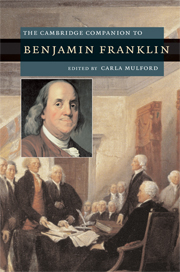Book contents
- Frontmatter
- Introduction
- 1 Benjamin Franklin’s library
- 2 The Art of Virtue
- 3 Franklin’s satiric vein
- 4 Franklin in the republic of letters
- 5 Benjamin Franklin’s natural philosophy
- 6 Franklin and the Enlightenment
- 7 Franklin and the question of religion
- 8 The pragmatist in Franklin
- 9 Franklin on national character and the Great Seal of the United States
- 10 Protestant ethic or conspicuous consumption? Benjamin Franklin and the Gilded Age
- 11 Benjamin Franklin and the American Dream
- 12 Benjamin Franklin’s Autobiography, then and now
- Further reading
- Index
8 - The pragmatist in Franklin
Published online by Cambridge University Press: 28 January 2009
- Frontmatter
- Introduction
- 1 Benjamin Franklin’s library
- 2 The Art of Virtue
- 3 Franklin’s satiric vein
- 4 Franklin in the republic of letters
- 5 Benjamin Franklin’s natural philosophy
- 6 Franklin and the Enlightenment
- 7 Franklin and the question of religion
- 8 The pragmatist in Franklin
- 9 Franklin on national character and the Great Seal of the United States
- 10 Protestant ethic or conspicuous consumption? Benjamin Franklin and the Gilded Age
- 11 Benjamin Franklin and the American Dream
- 12 Benjamin Franklin’s Autobiography, then and now
- Further reading
- Index
Summary
In an afterword to a volume celebrating the tricentennial of Franklin's birth, Edmund S. Morgan writes: “Pragmatism is the word most commonly used to describe Franklin's way of dealing with the world. We don't mean by it an adherence to the philosophy of Charles Sanders Peirce or William James . . . We mean, I think, simply a willingness to compromise in pursuit of some goal, a willingness not to insist on some abstract principle in transactions with other people, a willingness to make concessions.” As an example of this willingness, Morgan points to the Great Compromise at the Constitutional Convention in 1787 that broke the deadlock over representation between the large and the small states. I find in Morgan's passage a pair of suggestions: an interpretation of the meaning of Franklin's life and work, and an interpretation of the meaning of “philosophical” pragmatism. While I find Morgan's interpretation of Franklin quite sensible, his interpretation of philosophical pragmatism I find less so. He is correct to indicate that few see much of a connection between the pragmatism of Franklin and the pragmatism of Peirce and James (and Dewey). I believe, however, that we should.
This chapter will explore two themes: the range of Franklin's pragmatism and his place in the pragmatic tradition. First, it presents a view of Franklin's pragmatism that is, explicitly at least, broader than Morgan's, indicating that Franklin's religious and moral and scientific thinking is just as pragmatic as his political thinking. Then it suggests that Franklin's overall approach should be seen as being largely parallel with the later academic and social movement that we call philosophical pragmatism.
- Type
- Chapter
- Information
- The Cambridge Companion to Benjamin Franklin , pp. 104 - 116Publisher: Cambridge University PressPrint publication year: 2009
- 1
- Cited by



